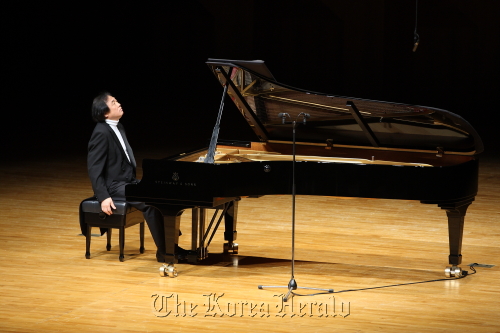Franz Liszt, a Hungarian gipsy, Catholic and true virtuoso open to improvisation, came to life at the fingertips of veteran pianist Paik Kun-woo in Seoul on Sunday evening.
The 64-year-old’s program on Sunday was the first part of the “Paik Kun-woo, and Liszt” recital celebrating the 200th year of the composer’s birth, covering almost all of Liszt’s pieces in two concert programs at the Seoul Arts Center’s Concert Hall.
All of the works in the first program were inspired by literary works.
Paik started off the evening calmly with “La Valee d’Obermann,” which Liszt wrote inspired by writer Etienne Pivo de Senancour’s “Premiere Annee de Pelerinage.”
The 64-year-old’s program on Sunday was the first part of the “Paik Kun-woo, and Liszt” recital celebrating the 200th year of the composer’s birth, covering almost all of Liszt’s pieces in two concert programs at the Seoul Arts Center’s Concert Hall.
All of the works in the first program were inspired by literary works.
Paik started off the evening calmly with “La Valee d’Obermann,” which Liszt wrote inspired by writer Etienne Pivo de Senancour’s “Premiere Annee de Pelerinage.”

Liszt tried to express a man’s desperate desire to see a ray of hope in the scenes of nature when facing hardship and pain, as the French author reflected in his novel what he experienced during the French Revolution.
With a big frown on his face, Paik seemed to be getting into the world of Liszt’s music without self consciousness. As the piece reached toward the end, the sound became weighty and serious with Paik clenching his jaw hard.
Moving on to the second piece, “Ka Cantique d’Amour,” inspired by Lamartine’s “Harmonies poetiques et religieuses,” the pianist’s left-hand arpeggios smoothly allowed the right-hand’s melodies to stand out strong and fade out in the end.
Paik’s virtuosity and dramatic techniques exploded with the third piece, “Mephisto Waltz No. 1” from Lenanus’ “Faust.” The literary work describes Mephisto taking Faust into an inn where people are dancing to violin music. Mephisto, not satisfied with the music, offers to play the violin himself. Paik’s performance conjured up the feeling of Mephisto mesmerizing people in the inn with exquisite variations in the first part. Passing through the mellow melodies in the mid section, Paik’s piano escalated with fast-changing beats, tremolos and syncopation. He ended it with two strong slams, immediately followed by thunderous applause.
Another highlight of the concert was the last piece, “Apres une Lecture de Dante,” based on a written work by Victor Hugo, who was inspired by Dante’s epic poem, “The Divine Comedy.”
Using all techniques at his disposal, Paik’s orchestral performance encompassed fast-flowing renditions as well as delicate touches of pianissimos to deliver the literary scenes ― the opening of the gate of hell, tears shed for the souls in pain and redemption in heaven.
After the performance, the applause suddenly stopped when a woman’s voice read a poem while Paik sat in front of the piano in the dark.
It was the voice of actress Yoon Jeong-hee, who is married to Paik. Her poetry reading was followed by Paik’s rendition of “Liebestraum No. 3.” by Liszt.
After the performance, Paik brought Yoon to the stage, kissed her on the hand and they bowed to the audience together.
However, there were hiccups in the Sunday recital. A cell phone rang, blaring Korean pop across the peaceful atmosphere of the first piece of the second half, “2 Legendes,” followed by mistimed clapping as Paik moved to the second movement from the first movement. He actually frowned, tilting his head.
The second program of “Paik Kun-woo, and Liszt” will take place on June 25.
By Kim Yoon-mi (yoonmi@heraldcorp.com)











![[Today’s K-pop] BTS pop-up event to come to Seoul](http://res.heraldm.com/phpwas/restmb_idxmake.php?idx=644&simg=/content/image/2024/04/17/20240417050734_0.jpg&u=)
![[Graphic News] More Koreans say they plan long-distance trips this year](http://res.heraldm.com/phpwas/restmb_idxmake.php?idx=644&simg=/content/image/2024/04/17/20240417050828_0.gif&u=)




![[KH Explains] Hyundai's full hybrid edge to pay off amid slow transition to pure EVs](http://res.heraldm.com/phpwas/restmb_idxmake.php?idx=652&simg=/content/image/2024/04/18/20240418050645_0.jpg&u=20240419100350)

